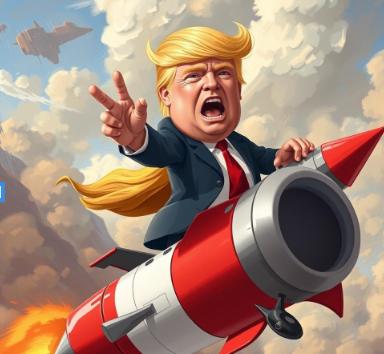$EURN $BTC $LMT
#Ukraine #Zelenskyy #Trump #Europe #Geopolitics #StockMarket #Crypto #Investing #NATO #DefenseStocks #Sanctions #Russia
European leaders have reaffirmed their support for Ukrainian President Volodymyr Zelenskyy following a tense meeting between him and former U.S. President Donald Trump at the White House. The geopolitical rift has caught the attention of global markets, particularly in sectors sensitive to defense spending and economic sanctions. The continuous uncertainty surrounding Western backing for Ukraine has put financial stress on European equities, especially those linked to NATO-aligned defense contractors. Stocks like $LMT (Lockheed Martin) and European defense companies have seen mixed performance as investors assess potential shifts in military aid. Meanwhile, the energy and commodities markets remain volatile, with European leaders focused on stabilizing energy supplies amid ongoing sanctions against Russia.
Cryptocurrency markets have also reacted to the political tensions, with Bitcoin ($BTC) experiencing a brief surge as investors hedge against geopolitical uncertainty. Historically, Bitcoin has been perceived as a safe haven during macroeconomic instability, as evidenced by its increased correlation with gold in recent months. However, the broader crypto market remains vulnerable to regulatory scrutiny, especially with Western governments considering stricter oversight of digital assets potentially linked to sanctioned Russian transactions. The European Central Bank’s stance on financial stability in the region may also influence how investors position themselves in the crypto space, leading to increased volatility.
Trump’s approach to foreign relations has raised concerns among European leaders, who fear a potential rollback of U.S. commitments within NATO. This uncertainty has weighed on European financial markets, particularly in sectors reliant on stable transatlantic relations. The euro has seen pressure against the U.S. dollar as currency traders react to potential disruptions in trade and diplomacy. European banking stocks, already facing headwinds from inflationary concerns, may experience additional volatility as markets assess future U.S. involvement in European security. Conversely, potential shifts in U.S. foreign policy could present opportunities for European leaders to assert greater autonomy in defense spending, benefiting local defense contractors and infrastructure suppliers.
Global investors are closely monitoring how European leadership solidifies its support for Ukraine amid evolving U.S. policies. As tensions between Ukraine and Russia persist, energy market disruptions continue to impact European economies, further affecting consumer confidence and corporate earnings. European leaders’ commitment to stabilizing financial markets will be crucial in navigating these geopolitical risks. Meanwhile, traders are keeping a close eye on defense stocks, foreign currency movements, and safe-haven assets like Bitcoin to adjust their portfolios accordingly. With markets remaining highly sensitive to political developments, investors should brace for continued volatility as Europe and the U.S. navigate this complex geopolitical landscape.







Comments are closed.